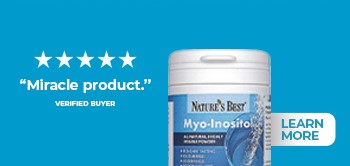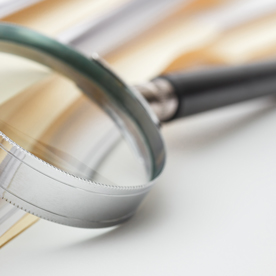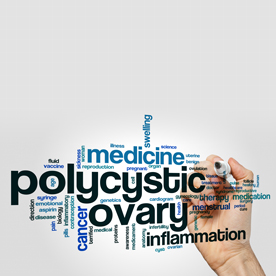
Although rare, it is possible to have both PCOS and endometriosis – or ‘endo’ as it’s more commonly referred to. One particularly challenging aspect of these conditions is that they usually take a long time to diagnose. Many women may go for years without discovering the root of their problem, which can lead to feelings of confusion, frustration and distress.i, ii
 While lots of symptoms are different and will affect your reproductive system in varying ways, there are crossovers between the PCOS and endometriosis. Both conditions can disrupt your period, trigger fluctuations in your mood, and cause fertility issues.
While lots of symptoms are different and will affect your reproductive system in varying ways, there are crossovers between the PCOS and endometriosis. Both conditions can disrupt your period, trigger fluctuations in your mood, and cause fertility issues.
If you’re experiencing unexplained symptoms, we’ve designed this simple guide to help you understand the disparities and similarities between the two conditions. More importantly, though, it hopes to empower you with practical ways to reclaim control over your body if you have PCOS, endo, or both.
Polycystic Ovary Syndrome: a brief overview
PCOS is a chronic condition characterised by a hormone imbalance.iii It occurs when your ovaries and adrenal glands produce an excessive amount of male hormones, like testosterone, sparking other comorbidities.iv
What are the hallmark symptoms?
Irregular periods
Imbalanced hormones disrupt your cycle, meaning you could get a period every two to three months, or in some cases, once or twice a year. Periods may last any length of time and tend to be heavy and painful.v Knowing how to cope with irregular periods can make living with PCOS a lot more manageable.
Fertility issues
Unpredictable periods aren’t only frustrating, but they signal your body isn’t ovulating on a regular basis, making conceiving difficult.vi
Unexplained weight gain
Hormone trouble skews your insulin production and may lead to weight gain.vii
Excessive hair growth (Hirsutism)
Having more testosterone in your body can trigger male-pattern hair growth on the face, upper lip, chin, neck, back, abdomen and chest.viii Typically, it’s dark and coarse in nature.
Acne
Hormonal changes can affect your skin too, causing oiliness and outbreaks in pimples.ix
Emotional woes
As expected with any hormonal condition, PCOS has emotional implications as well as physical. This condition is often thought to trigger depression, anxiety and other mental health issues.x
Endometriosis: a brief overview
Although experts have struggled to understand what causes the abnormal growth of the endometrial lining that underpins this chronic condition, they are certain on one thing: unlike PCOS, endometriosis is characterised by severe pain, which can be incapacitating for the women who have it.xi
What are the hallmark symptoms?
Stomach cramps
Sharp, shooting stomach cramps may occur out of the blue and throw your daily routine into disarray.xii
Period problems
Like PCOS, endometriosis can trigger irregular, heavy bleeding, which can be infuriating and inconvenient.xiii
Pain during sex (dyspareunia) and using the bathroom
Debilitating pangs may overwhelm your body during these activities. It is also possible that you’ll experience general pelvic pain when you’re going about your daily life.xiv
Fertility issues
As with PCOS, this chronic condition doesn’t make it impossible to have children, but it can certainly make it more challenging.xv
Psychological impact
Since endometriosis can affect your social and psychological functioning, it may compromise your sexuality, mental health and social relationships too.xvi Misinformation and lack of diagnosis could also intensify mental health problems.xvii But whether its PCOS or endometriosis you’re suffering with, we have some great tips for optimising your emotional health.
What if I have both?
The symptoms of both PCOS and endometriosis tend to be mixed and fuzzy, which is why pinning down a solid diagnosis can be so difficult. Try to imagine a Venn diagram of the PCOS and endometriosis symptoms we’ve discussed above. You can see there’s overlap between heavy, irregular and painful periods, mood fluctuation, and infertility. And in many cases, this will be accompanied by bad skin, odd hair growth and chronic pelvic pain.xviii
How can they be treated?
Typically, hormonal birth control such as the contraceptive pill is the first line of defence for both endometriosis and PCOS, since it can help regulate your cycle and make periods less of a painful ordeal.xii, xx IVF and other complementary therapies may also improve your chances of falling pregnant, so it might be an idea to discuss a fertility plan with your partner. It is wise to arm yourself with a range of mood-boosting, stress-busting tools such as meditation, mindfulness, deep breathing or visualisation if things are getting a little too much.
Beyond this point, treatment plans will diverge. You may have noticed that our hub addresses the PCOS comorbidities on a symptom-by-symptom basis, using natural alternatives, diet, exercise and supplements. Similar lifestyle changes can improve endometriosis, but surgical intervention is available too.
Doctors can cut away the excess endometrial lining, or even remove the ovaries and uterus (don’t worry – this is the last resort, and lots of women can still have children post-surgery).xxi But invasive treatments won’t work for everyone. A combination of exercise, diet, sleep, hormone-therapy, strong painkillers and current medical treatment is a great place to start.
Final thoughts
Though rare, women do experience both conditions. And it’s time to break the silence and kick-start the conversation about it. As with any chronic condition, the sooner you receive a diagnosis, the sooner you can start exploring ways to help alleviate the pain.
Tell your physician everything – and we mean everything. Be specific about the discomfort and unpleasant symptoms you’re experiencing. And be persistent; don’t downplay how you feel. We hope this simple guide has clarified any questions you may have had about PCOS and endometriosis. If you’re still feeling worried, we urge you to seek further support. You don’t need to battle through alone.
Enjoyed reading this article? Why not browse the rest of our hub and discover even more ways to reclaim control over your PCOS?
References:
-
Overton, C., Park, C. (2010). Endometriosis: more on the missed disease. BMJ. 341:c3727.
-
Moradi, M., Parker, M., Sneddon, A., Lopez, V. and Ellwood, D. (2014). Impact of endometriosis on women’s lives: a qualitative study. BMC Women’s Health, 14, 123.
-
Sirmans, S.M. and Pate, K.A. (2014). Epidemiology, diagnosis, and management of polycystic ovary syndrome. Clinical Epidemiology, 6, 1–13.
-
Rosenfield, R.L. and Ehrmann, D.A. (2016). The Pathogenesis of Polycystic Ovary Syndrome (PCOS): The Hypothesis of PCOS as Functional Ovarian Hyperandrogenism Revisited. Endocrine Reviews, 37(5), 467–520.
-
Martin, M.L., Halling, K., Eek, D., Krohe, M. and Paty, J. (2017). Understanding polycystic ovary syndrome from the patient perspective: a concept elicitation patient interview study. Health and Quality of Life Outcomes, 15, 162.
-
Diamanti-Kandarakis, E. and Dunaif, A. (2012). Insulin Resistance and the Polycystic Ovary Syndrome Revisited: An Update on Mechanisms and Implications. Endocrine Reviews, 33(6), 981–1030.
-
Legro, R.S., Arslanian, S.A., Ehrmann, D.A., Hoeger, K.M., Murad, M.H., Pasquali, R. and Welt, C.K. (2013). Diagnosis and Treatment of Polycystic Ovary Syndrome: An Endocrine Society Clinical Practice Guideline. The Journal of Clinical Endocrinology and Metabolism , 98(12), 4565–4592.
-
Spritzer, P.M., et al. (2016). Hirsutism in Polycystic Ovary Syndrome: Pathophysiology and Management. Curr Pharm Des. 22(36): 5603-5613.
-
Elsaie, M.L. (2016). Hormonal treatment of acne vulgaris: an update. Clinical, Cosmetic and Investigational Dermatology, 9, 241–248.
-
Conte, F., Banting, L., Teede, H.J. and Stepto, N.K. (2015). Mental Health and Physical Activity in Women with Polycystic Ovary Syndrome: A Brief Review. Sports Medicine (Auckland, N.z.), 45(4): 497–504.
-
US Department of Health and Human Service. (2018). Endometriosis Available online: https://www.nichd.nih.gov/health/topics/endometriosis
-
Schliep, K.C., Mumford, S.L., Peterson, C.M., Peterson, C.M., Chen, Z., Johnstone, E.B., Sharp, H.T. and Buck Louis, G.M. (2015). Pain typology and incident endometriosis. Human Reproduction (Oxford, England), 30(10), 2427–2438.
-
Moradi, M., et al. Impact of endometriosis. 123.
-
Endometriosis.org. (2018). Painful intercourse. Available online: http://endometriosis.org/resources/articles/painful-intercourse/
-
Laganà, A.S., La Rosa, V.L., Rapisarda, A.M.C., Valenti, G., Sapia, F., Chiofalo, B. and Vitale, S.G. (2014). Anxiety and depression in patients with endometriosis: impact and management challenges. International Journal of Women’s Health. 9, 323–330.
-
Bulletti, C., Coccia, M.E., Battistoni, S., and Borini, S. (2010). Endometriosis and infertility. Journal of Assisted Reproduction and Genetics , 27(8), 441–447.
-
Moradi, M., et al. Impact of endometriosis. 123.
-
Endometriosis.org. (2018). The Pill. Available online: http://endometriosis.org/treatments/oral-contraceptive-pill/
-
PCOS Awareness Association (2018). PCOS Treatments. Available online: http://www.pcosaa.org/pcos-treatments/
-
Duffy, J.M.N., Arambage, K., Correa, F.J.S., Olive, D., Farquhar, C., Garry, R., Barlow, D.H., and Jacobson, T.Z. (2014). aparoscopic surgery for endometriosis. Cochrane Database of Systematic Reviews. 4.
-
Moradi, M., et al. Impact of endometriosis. 123.
Related Posts?
Disclaimer: The information presented by Nature's Best is for informational purposes only. It is based on scientific studies (human, animal, or in vitro), clinical experience, or traditional usage as cited in each article. The results reported may not necessarily occur in all individuals. Self-treatment is not recommended for life-threatening conditions that require medical treatment under a doctor's care. For many of the conditions discussed, treatment with prescription or over the counter medication is also available. Consult your doctor, practitioner, and/or pharmacist for any health problem and before using any supplements or before making any changes in prescribed medications.

Olivia
Olivia Salter has always been an avid health nut. After graduating from the University of Bristol, she began working for a nutritional consultancy where she discovered her passion for all things wellness-related. There, she executed much of the company’s content marketing strategy and found her niche in health writing, publishing articles in Women’s Health, Mind Body Green, Thrive and Psychologies.
View More



